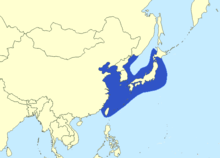Japanese Spanish mackerel
| Japanese Spanish mackerel | |
|---|---|

| |
| Scientific classification | |
| Domain: | Eukaryota |
| Kingdom: | Animalia |
| Phylum: | Chordata |
| Class: | Actinopterygii |
| Order: | Scombriformes |
| Family: | Scombridae |
| Genus: | Scomberomorus |
| Species: | S. niphonius
|
| Binomial name | |
| Scomberomorus niphonius (Cuvier, 1832)
| |

| |
| Synonyms | |
| |
The Japanese Spanish mackerel (Scomberomorus niphonius), also known as the Japanese seer fish, is a species of true mackerel in the scombrid family (Scombridae).[2] Their maximum reported length is 100 cm, and the maximum reported weight is 10.57 kg.[3]
Fisheries
Japanese Spanish mackerel is an important species for fisheries in east Asia. South Korea is the country reporting the biggest annual catches, followed by Japan and Taiwan. These added to a relatively modest total catch of about 56,000 tonnes in 2009. However, China reports very large catches of unidentified seer fish (Scomberomorus spp., fluctuating around 400,000 tonnes in 2000–2009), without reporting catches of any single Scomberomorus species.[4] It is likely that these catches include a significant proportion of Japanese Spanish mackerel.[citation needed]
 Capture of Japanese Spanish mackerel in tonnes from 1950 to 2009 [5]  |
As food
Japanese Spanish mackerel is commonly served grilled or pan-fried in Korea as samchi-gui (food). Japanese Spanish mackerel is often served as sushi, under the Japanese name sawara (鰆, サワラ).[citation needed]
Notes
- ^ Collette, B.; Chang, S.-K.; Di Natale, A.; Fox, W.; Juan Jorda, M.; Nelson, R.; Uozumi, Y. (2011). "Scomberomorus niphonius". IUCN Red List of Threatened Species. 2011: e.T170356A6767322. doi:10.2305/IUCN.UK.2011-2.RLTS.T170356A6767322.en. Retrieved 11 November 2021.
- ^ "Scomberomorus niphonius (Cuvier, 1832)". Integrated Taxonomic Information System. Retrieved 9 March 2012.
- ^ "IGFA Records". Archived from the original on May 29, 2016.
- ^ FAO (Food and Agriculture Organization of the United Nations) (2011). Yearbook of fishery and aquaculture statistics 2009. Capture production (PDF). Rome: Food and Agriculture Organization of the United Nations. p. 230. Archived from the original (PDF) on 2017-05-19.
- ^ Scomberomorus niphonius (Cuvier, 1831) FAO, Species Fact Sheet. Retrieved 2 March 2012.
References
- Collette, B.; Chang, S.-K.; Di Natale, A.; Fox, W.; Juan Jorda, M.; Nelson, R.; Uozumi, Y. (2011). "Scomberomorus niphonius". IUCN Red List of Threatened Species. 2011: e.T170356A6767322. doi:10.2305/IUCN.UK.2011-2.RLTS.T170356A6767322.en. Retrieved 11 November 2021.



